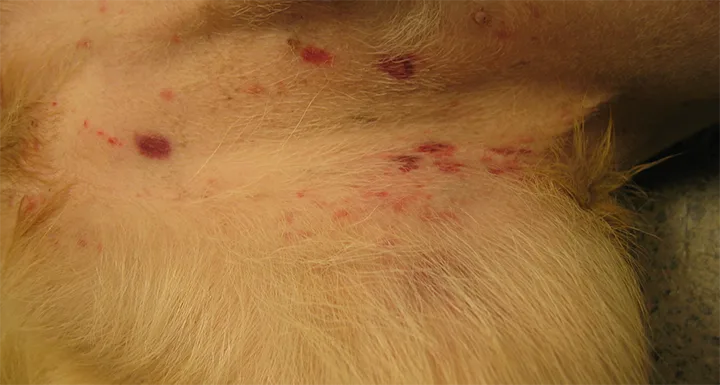Immune-Mediated Thrombocytopenia in a Dog
Andrew Bugbee, DVM, DACVIM (SAIM), Texas A&M University
Kate, a 5-year-old spayed German shepherd dog, is presented for abdominal bruising, acute-onset discolored stool (ie, black) of 24 hours’ duration, and recent stranguria with pollakiuria. One year prior, she had a UTI caused by Escherichia coli that was treated with a 10-day course of amoxicillin (15 mg/kg PO every 8 hours). Kate receives monthly heartworm, flea, and tick preventives and is current on vaccines. She was vaccinated 7 months prior to presentation, at which time, point-of-care ELISA test results for heartworm, borreliosis, ehrlichiosis, and anaplasmosis were negative. She is otherwise healthy.
On physical examination, Kate is quiet but alert and responsive. BCS is 4/9. Petechiation of the mucous membranes with multiple petechiae and ecchymoses on the ventral abdomen are the only abnormal physical examination findings (Figure 1). Melena is observed when the patient defecates (Figure 2).

Petechiation and ecchymoses on the ventral abdomen. Image courtesy of Benjamin Brainard, VMD, DACVAA, DACVECC

Melenic stool seen during examination. Image courtesy of Benjamin Brainard, VMD, DACVAA, DACVECC
Abnormalities on CBC include moderate regenerative anemia (28%; reference interval, 41.2%-54.8%), severe thrombocytopenia (<10,000/µL; reference interval, 226,000-424,000/µL), and mild leukocytosis characterized by mature neutrophilia (10,331/µL; reference interval, 2,700-8,500/uL). Blood smear is assessed for concurrent hemolysis, but no spherocytosis is noted; saline agglutination test is negative. Serum chemistry profile results are unremarkable. Free-catch urinalysis reveals numerous WBCs and bacteriuria.
Thoracic and abdominal radiography and abdominal ultrasonography are performed to rule out concurrent disease (eg, neoplasia) as a secondary cause of platelet destruction, but results are unremarkable. A comprehensive vector-borne infectious disease panel (including Anaplasma spp, Babesia spp, Bartonella spp, Ehrlichia spp, and hemotropic Mycoplasma spp) is seronegative and PCR negative for all assessed organisms.
Without an identifiable precipitating cause, Kate is presumptively diagnosed with primary immune-mediated thrombocytopenia (ITP). Antiplatelet antibody testing is available but is not pursued, as the results would not affect clinical decision-making in this case.
Red Light, Green Light Challenge
Listen to the Podcast
Want more information on ITP? Listen to Dr. Bugbee dive deeper on Clinician's Brief: The Podcast.